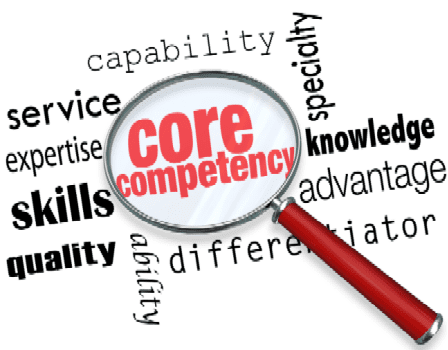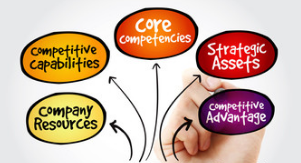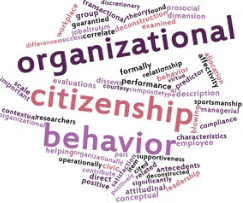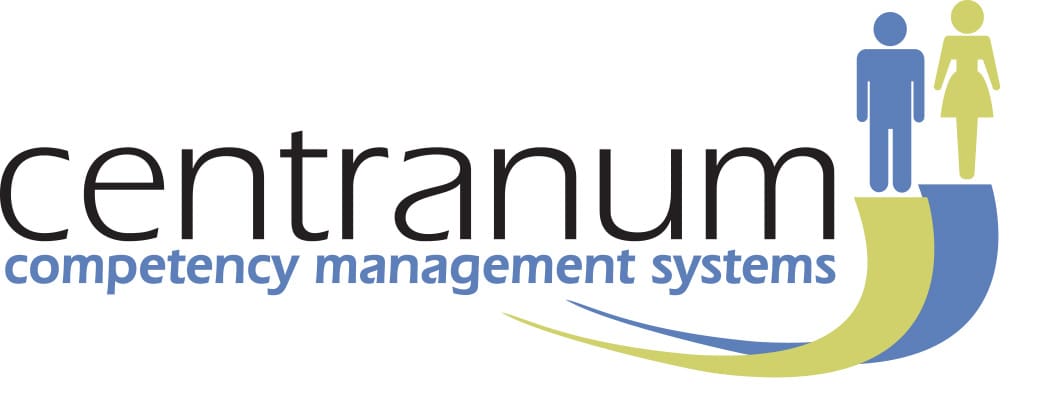
What is a Core Competency?
A Core Competency is knowledge, skills and their application that is vital to the success of an organization. It can be defined at the organization level and/or at the individual level
Organizational Level

Examples include
- Apple’s ability to design, market and produce user friendly devices with visual and tactile appeal.
- Singapore Airline’s customer centric service bundling of aircraft comfort, quality in-flight service, attentive crew.
- Avon cosmetics direct sales process
- Hubspot’s inbound marketing system
Identifying the core competencies of your organization is a fundamental step in strategic management.
The concept of “Core Competency” comes from management professors Gary Hamel & C.K. Prahalad. They introduced the idea in their 1990 article for the Harvard Business Review – “The Core Competence of the Organisation.” They wrote:
A company’s competitiveness derives from its core competencies and core products (the tangible results of core competencies).
Core competence is the collective learning in the organization, especially the capacity to coordinate diverse production skills and integrate streams of technologies
… core competencies, … meet these three requirements: they provide potential access to a wide variety of markets, make a contribution to the customer benefits of the product, and are difficult for competitors to imitate.
Individual Level
From the Organizational Psychology literature comes the concept of Organizational Citizenship Behaviour. Behaviour that goes beyond the requirements of an individual’s job description – sometimes termed “extra-role’ behaviours.
“performance that supports the social and psychological environment in which task performance takes place” (Organ, D. W. (1997). Organizational citizenship behavior: It’s construct clean-up time. Human Performance, 10, p. 95).

Organizational Citizenship Behaviour includes elements of conscientiousness, altruism and peacekeeping, courtesy, civic spirit and sportsmanship.
The principles of reciprocity and team dynamics are the foundation for many of these behaviours.
- People who display conscientiousness will turn up on time, follow rules, attend to detail, see things through and go the extra mile.
- People who display altruistic behaviours will share their expertise, assist others in their work, co-operate, provide emotional support, and try to solve problems involving others.
- Courtesy means positive interpersonal behaviours, being considerate and tactful, good manners and the avoidance of conflict.
- Civic spirit means supporting and promoting, cheer leading the group or organization in its purposes and goals, making suggestions for improvement, keeping up with organizational events, participating in initiatives that are not mandatory, speaking up when needed.
- Sportsmanship reflects the readiness of staff to put up with uncomfortable situations, not complaining.
Organizational citizenship behaviours are supposed to be for the benefit of the organization.
However the motive for their practice at individual level is primarily impression management. Employees want to project a favourable image for performance evaluation and career advancement. Thus organizational citizenship behaviours are potentially a win win situation.
For this reason there has been a great deal of interest in these concepts especially since the beginning of the 21st century.
How to use Core Competencies

The list typically includes cognitively based competencies such as;
- Communication Skills
- Digital Literacy
- Thinking Skills of various types – e.g. Systems thinking, Mathematical, Analytics
- Problem solving
- Decision Making
- Innovation and Creativity
- Learning Agility
Core or citizenship competencies are used to communicate expectations. They may represent the behaviours required to deliver on the organization’s Mission and Values – for example “Empathy” in Health and Social Service organizations.
Most commonly they are broad competencies that enable people to work effectively individually and as part of a team.
To emphasise their importance they can be part of the performance management system. Since they are unlikely to be measured objectively it is better to provide for qualitative (comments) rather than quantitative feedback (ratings).
_____________________________________________________________________________
and competencies relating to the team environment such as:
- Interpersonal skills
- Team work
- Building Relationships
- Collaboration
- Service
- Business Acumen
- Supporting the Organization
- Leadership
- Developing People
- Diversity/Cultural Competency
